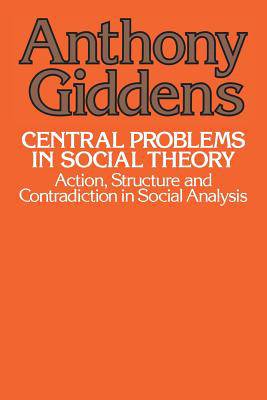
- Retrait gratuit dans votre magasin Club
- 7.000.000 titres dans notre catalogue
- Payer en toute sécurité
- Toujours un magasin près de chez vous
- Retrait gratuit dans votre magasin Club
- 7.000.0000 titres dans notre catalogue
- Payer en toute sécurité
- Toujours un magasin près de chez vous
Central Problems in Social Theory
Action, Structure, and Contradiction in Social Analysis
Anthony Giddens
Livre broché | Anglais
52,45 €
+ 104 points
Description
In this new and brilliantly organized book of essays, Anthony Giddens discusses three main theoretical traditions in social science that cut across the division between Marxist and non-Marxist sociology: interpretive sociology, functionalism, and structuralism.
Beginning with a critical examination of the importance of structuralism for contemporary sociology, the author develops a comprehensive account of what he calls "the theory of structuration." One of the main themes is that social theory must recognize, as it has not done hitherto, that all social actors are knowledgeable about the social systems they produce and reproduce in their conduct. In order to grasp the significance of this, he argues, we have to reconsider some of the most basic concepts in sociology.
In particular, Giddens argues, it is essential to recognize the significance of time-space relations in social theory. He rejects the distinction between synchrony and diachrony, or statics and dynamics, involved in both structuralism and functionalism, and offers extensive critical commentary on the latter as an approach to sociology.
The book, which can be described as a "non-functionalist manifesto," breaks with the three main theoretical traditions in the social sciences today while retaining the significant contributions each contains. In so doing Giddens discusses a range of fundamental problem areas in the social sciences: power and domination, conflict and contradiction, and social transformation. He concludes with an overall appraisal of the key problems in social theory today.
Beginning with a critical examination of the importance of structuralism for contemporary sociology, the author develops a comprehensive account of what he calls "the theory of structuration." One of the main themes is that social theory must recognize, as it has not done hitherto, that all social actors are knowledgeable about the social systems they produce and reproduce in their conduct. In order to grasp the significance of this, he argues, we have to reconsider some of the most basic concepts in sociology.
In particular, Giddens argues, it is essential to recognize the significance of time-space relations in social theory. He rejects the distinction between synchrony and diachrony, or statics and dynamics, involved in both structuralism and functionalism, and offers extensive critical commentary on the latter as an approach to sociology.
The book, which can be described as a "non-functionalist manifesto," breaks with the three main theoretical traditions in the social sciences today while retaining the significant contributions each contains. In so doing Giddens discusses a range of fundamental problem areas in the social sciences: power and domination, conflict and contradiction, and social transformation. He concludes with an overall appraisal of the key problems in social theory today.
Spécifications
Parties prenantes
- Auteur(s) :
- Editeur:
Contenu
- Nombre de pages :
- 294
- Langue:
- Anglais
Caractéristiques
- EAN:
- 9780520039759
- Date de parution :
- 29-11-79
- Format:
- Livre broché
- Format numérique:
- Trade paperback (VS)
- Dimensions :
- 139 mm x 209 mm
- Poids :
- 335 g

Les avis
Nous publions uniquement les avis qui respectent les conditions requises. Consultez nos conditions pour les avis.






